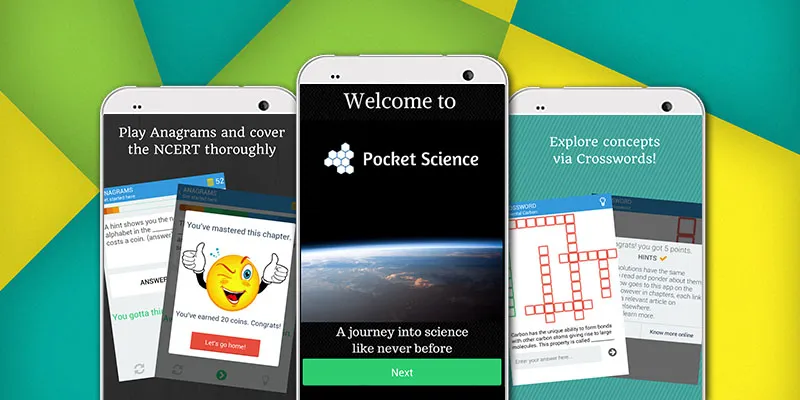Pocket Science aims to help CBSE students learn science through anagrams and crosswords

“The task of the modern educator is not to cut down jungles, but to irrigate deserts.”
― C.S. Lewis
Over the last decade, companies in the education sector have made inroads online and reached out to a much larger audience. More students are able to benefit and study at their own convenience, irrespective of where they are in the world.
On a global scale Coursera, Udemy, Udacity, and Khan Academy are among the popular online sources of education. India too has many startups and well established enterprises tapping into specific niche areas. These are as different as competitive exams preparations, online coaching classes, and online tests etc.

Pocket Science, a startup in the education sector, aims to gamify the learning process through anagrams and crosswords for class 10 CBSE students to help them engage and learn faster.
Starting up
Vineesh Kumar, an IIT-D alum, had been working in the education sector for six years. He started his first venture, Weboword, with the aim of creating a visual vocabulary. He also worked with Aakash Institute on materializing and launching their iTutor product. He then quit his job and conceptualized science learning through games and launched the first version of the mobile app, PocketScience, in Nov. 2013.

Vineesh found his Co-founder Pardeep Goyal through the accelerator, ‘The Morpheus’, in Delhi. Pardeep was also running a startup in education domain that did not take off. They found that they had similar interests in the education and technology sectors and hence decided to collaborate and work together on PocketScience. Vineesh looks after all aspects of the product, while Pardeep looks after marketing.
Pocket Science
The app covers CBSE Class X SA2 science chapters such as Carbon and its compounds, Periodic classification of elements, Heredity and evolution, Light: Reflection and Refraction etc.The app content is available offline once downloaded. CBSE syllabus is covered in games with 900 questions in Anagrams and 100+ crosswords.
Through their experience in the education sector, they realized that multiple choice questions are much easier to solve and won’t help the user learn the subject well enough. Hence, they decided to go ahead with anagrams and crosswords, which are more challenging and require the user to think and introspect more. The app also features a discussion forum for users to interact and discuss problems.
The journey so far

They are building a mobile-only product because smartphones are more accessible today than ever. At present, they have over 8000 app downloads by students who have spent more than 1000 hours playing games and attempting science questions over a million times.
Their endeavor for the last one-and-half years has been on making the learning process more interesting and engaging, which has yielded dividends. As a key takeaway, they saw immense potential in improving learning and its outcomes through gamification.
More recently, they also saw the power of conversations in stimulating learning. They were able to get more interactions on their Facebook page through open-ended questions and regular updates.They feel that learning and education is an open field where much remains to be explored and that they have only seen the tip of the iceberg.
Along with the Science learning app, they had launched another app for preparation for the NTSE, a scholarship exam for class X students. This was a discussion-based mobile app where they asked one question everyday till the exam. They received good response with 2000 downloads and 1200 in-app comments in two months. They are planning to launch more exam focused apps in the future.
They were a part of the Morpheus since September 2013. “Our involvement there was transformational for our thought process. Many accelerators and incubator groups are involved only till demo day, but The Morpheus is as helpful and accessible today as they were last year,” said Pardeep.
Pocket Science was a runner up for mBillionth Award, a platform to explore the potential of mobile and telecom sector across eight countries in South Asia in the education category.They received useful feedback from the jury which helped them in improving their product. After getting positive feedback from both experts and users, they feel more confident about the concept of ‘gamifying’ science learning. Their USP is to transform the learning process into fun and interesting games.
PocketScience was also recently shortlisted by NASSCOM for their 10,000 startups program, and by Facebook for their program FbStart, designed to help early stage mobile companies.
Competitors
There are many Indian startups in niche sectors, but for high school education in class 6 to 12 range possible competitors for PocketScience could be Topper Learning, and tcyonline etc. PocketScience’s strategy has been going mobile first, while their competitors are focusing on website versions and not all of them are focusing on mobile apps. So the current scenario is interesting and it will be interesting to see how it plays out.
Related read: Online Test Preparation startups being built from India
Future plans
As of now PocketScience only caters to the needs of class-X students, but they plan to test discussions within app to support collaborative learning. They are also planning to introduce learning content for classes 6 to 12 in the coming future.
PocketScience is still in beta phase and the free version is available on the Google Play store.
Website : Pocket Science, App







